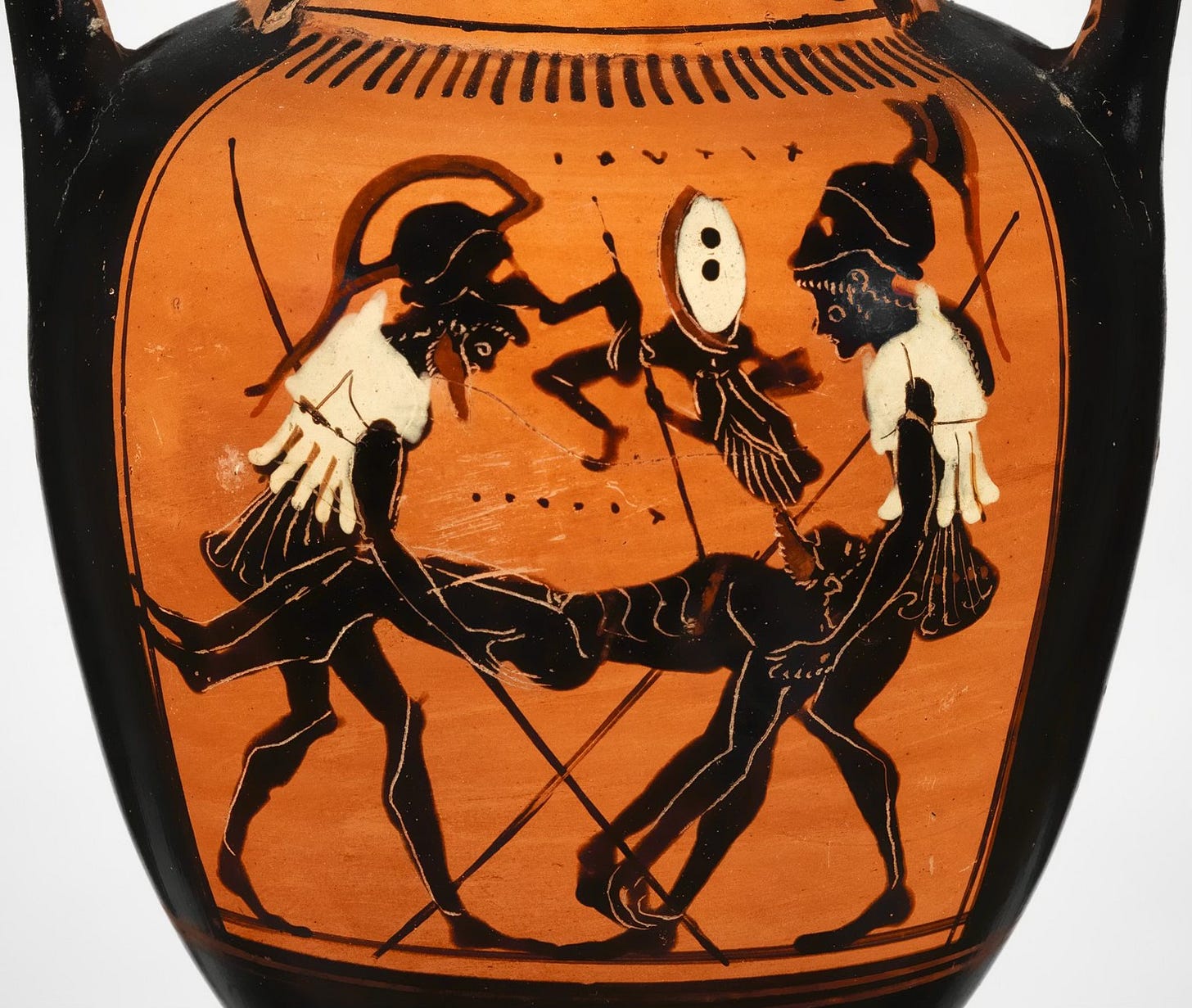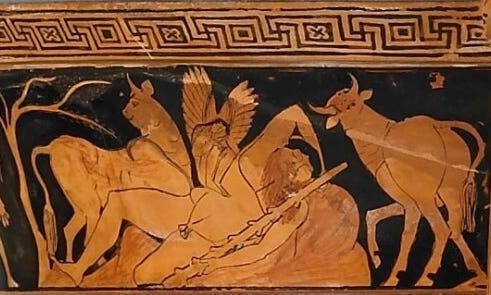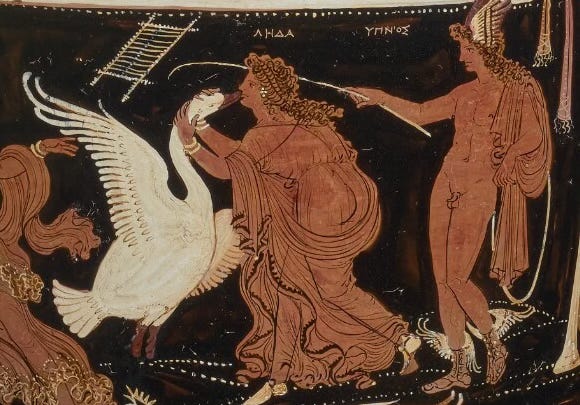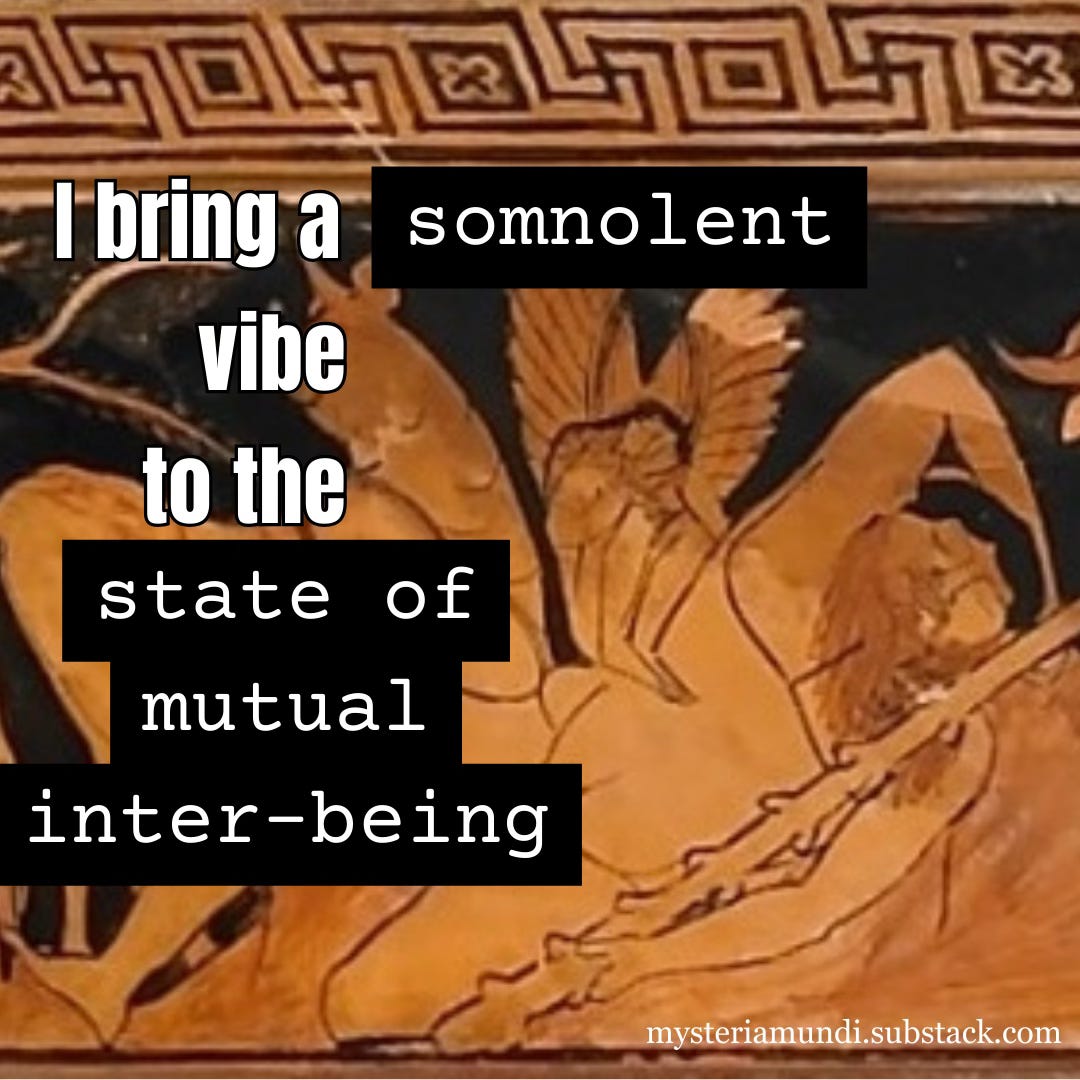A New Translation of the Orphic Hymn of Hypnos (Sleep)
And what Sleep can teach us about the non-duality of the divine

Sleepless Nights, Exhausted Days
Maybe it’s the screens. Maybe it’s the *gestures vaguely at world.* But it seems like everyone I know has trouble sleeping. We’re jangled and frazzled and grief-stricken and distracted. So Sleep often doesn’t come easy.
Or, on the contrary, it comes TOO easily, as in chronic fatigue or depressive states where even getting out of bed or taking a showers is just too much.
Either way, our relationship with Sleep is often troubled, and whether we’re plagued with insomnia or fatigue, what many of us lack is truly deep, restorative rest.
It’s important to me to acknowledge here at the outset of this commentary that the topic of Sleep can make people feel anxious and hopeless. Of course, the bitter irony is that the state of Sleeplessness INDUCES anxiety, as key neurotransmitters and hormones like cortisol and serotonin remain high during bouts of insomnia, rather than decreasing to promote sleep.
And then there also are just so many cultural “shoulds” around sleep that add to our worries and sense of futility: We SHOULD get 8 hours a night, We SHOULD rest more so we can be more productive the next day, We SHOULD have painless, night-mare free sleep rather than the troubled sleep of trauma survivors, etc. etc. etc.
As someone who suffered from literally decades of PTSD nightmares and who now struggles with the sleep issues of chronic illness, I want to say to those of you going through sleep difficulties: I SEE YOU.
I wouldn’t want anyone reading this Hymn or the commentary that follows it to come away feeling like, “oh great, now in addition to not being able to sleep, I’m also missing out on sleep as a critical part of the Orphic mysteries.”
On the contrary, I hope that I can present a view of Sleep that while recognizable in some respects — for instance, in its attention to the healing powers of truly restorative Sleep — also differs radically from our understanding of Sleep as something that is confined to our own individual body, and that can be measured in terms of success and failure.
The Orphics teach us the profound ancient truth that Sleep is a BEING with whom you can have a relationship.
And what is more, they teach us that engaging with states of Sleep and wakefulness is a communal process, not limited to the confines of the self/body we have come to identify so strongly with in the modern, Westernized world.

Hypnos (Sleep) as an Inter-Being
What do I mean by this? Well, to begin with, as you may remember from my post on Kronos, the Orphics conceived of space-time itself as a body. And we are living within this animate cosmic body a little like the micro-organisms in our own gut or on own skin.
We interweave with each other to produce a “me” that is changing each and every moment, continually composed, decomposed, and recomposed of a near-infinite variety various beings: micro-organisms; the cells and neurotransmitters and hormones of our own body; viruses and bacteria that enter and exit us; the bodies of plants, animals, and minerals that we ingest; the DNA of our ancestors and the communities and environments and micro-organisms THEY were exposed to; and on and on and on.
And for the Orphics, Sleep (like anything and everything else in the cosmos) is one of these beings, always already in community with us in much the same way as our gut flora is. It doesn’t even make sense to think of Sleep as either “us” or “not us.”
In this sense, Sleep is a perfect figure to work with as we seek broaden and decolonize our own concept of “deity” or “god.” Because that’s what the Orphic material challenges us to do — to break down the binary of human/divine, of us/them, of my body/your body.
Because here’s the thing: ALL gods are always already “inter-being” with us.
This is not a new observation of my own. Buddhist teacher Thich Nhat Hanh coined the English term decades ago to describe the state of mutual interdependence of all living beings. And the Sarah 50 of the Qur’an famously says that God is “closer than our jugular vein.”
But at around the same time the Buddha was teaching in India, and about a thousand years before the advent of Islam, the Orphics were taking these same concepts for granted in their hymns. When we read an Orphic hymn we enter a cosmos that is vibrantly alive, vibrantly divine, and always already “inter-being” with our own body.
In fact, the Orphic understanding of Sleep/Hypnos teaches us that just as it doesn’t make sense to separate Sleep as a deity from our own human body, it also doesn’t make sense to separate Hera or Hermes/Mercury or the Sun/Helios or the Earth/Gaia or Space-Time/Kronos any other of the natural phenomena and processes addressed in the hymns.
All of the cosmos is constantly interwoven and inter-being with us. Always already weaving in and out of “our” body, constituting it and breaking it down, flowing through us in a never-ending ecstatic dance and song. And when one day our fleshly parts break down and return to Gaia, we will continue interweaving and inter-being with our other cosmic kin in the eternal dance of Life.
So What Now?
Once we accept that every part of our experience is an interweaving of cosmic Life (also known in Orphic parlance as “the All”), then we have the opportunity to shift our relationship to Sleep.
I’m not going to overpromise here and say that working with the Hymn of Hypnos (Sleep) will bring you instantaneous deep and untroubled rest. I mean, it might. I myself have taken so long to translate this hymn because every time I worked with it, I started feeling groggy and needed a nap.
But more likely, there won’t be an instant effect. Rather, what might happen is that you find yourself speaking to Sleep as you might to a friend or beloved with whom you are experiencing troubled times. Invite Sleep over for a cup to tea to chat and figure out what’s going on. Ask Him what advice or counsel He Himself (and not your smartwatch or Youtube video or whathaveyou) would give. It might be something you expect to hear (e.g. turn off your screens before bed) but it also might not be at all.
Don’t be afraid to ask Him hard questions. He’s a holy being, He can take it: “Why are you so elusive? Why does my pain not recede when you visit me? Why do I feel like You visit me too much, so I can barely get out of bed?” Be open to the answers that surface and if You find yourself feeling anxious by what you “hear,” ask Sleep about that too.
And don’t worry about the “reality” of your interactions with Sleep. As I hope is abundantly clear by now, in the Orphic understanding of the world, things both “are” and “are not” at the same time. If you’re not sure if your conversations with Sleep are “just in your head,” well, that’s because the divine, just like everything else, exists in a non-dual “both/and”, “is/isn’t” state. Sleep (and conversations with Sleep) can’t be properly understood, the Orphics might say, in a dualist framework of either/or, divine/human, transcendent/mundane.
So on that note, I present to you the Hymn of Hypnos. The rest of my thoughts on Sleep will come as commentary notes in upcoming posts, so stay tuned.
✨✨ Kristin






